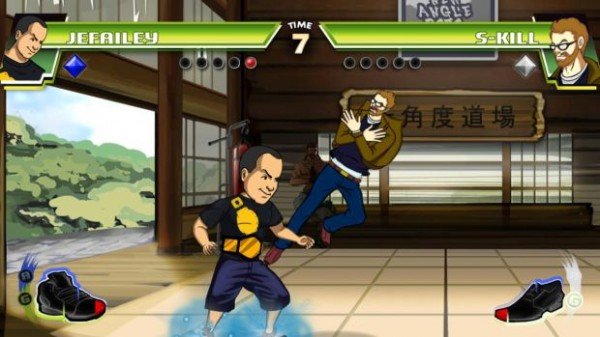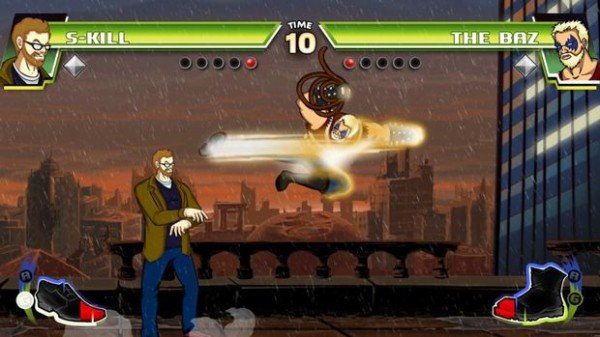Switch to: German
Ever wanted to be good at a fighting game, without having to deal with a large roster of characters or difficult combos? If so, Divekick is the game for you, with a relatively small cast of characters and controls that only utilise two buttons.
Divekick started out even simpler than the final game. Featuring only two characters – Dive and Kick – it quickly became popular enough to warrant a full game. The main gameplay mechanic revolves around the titular ‘divekick’, an angled aerial kick used by many fighters to cancel movement while in the air. While you’d think using only one move would be boring, Divekick adds in enough variations to make it feel more varied.
The game is structured similarly to many of today’s fighters. Each fight is made up of rounds, and you win when you beat the opponent a set amount of times. There’s also a time limit to worry about, which is much shorter than other conventional fighters. This is because characters can only take one hit before losing all their life, drastically reducing the time taken for any given match.
Easy to pick up, hard to master
As mentioned earlier, Divekick only makes use of two inputs for gameplay, which can be easily mapped to any buttons you wish. One button takes care of dives, while the other kicks. The kick button can also make you jump backwards while on the ground, giving you a greater range of movement.
Each character has their own set of unique super moves, which are activated by pressing both buttons together. These require a certain amount of meter to use, which is gained by kicking. The amount of meter needed and the type of move you do depends on whether you are airborne or not. These moves greatly change how matches play out, since they allow you to move and attack in different ways. If you manage to fill your special meter, you enter ‘kick-factor’ which powers you up for a set amount of time, until the meter runs out or you lose a round.
Further variety is added to the game in the form of gems. Gems are chosen at the character select screen, and give bonuses depending on your choice. For example, the kick gem boosts the speed of your kick attacks, while the aptly named ‘YOLO’ gem gives you a massive boost in all areas, but once you take a hit, you lose.
Multiplayer & Cross functions
As expected, Divekick also has both local and online multiplayer. The online multiplayer layout is greatly simplified thanks to the two button layout, meaning that options are limited. Online works well and cross-play between the PS3 and Vita versions is supported, but the Vita versions online play is noticeable worse, especially when trying to find a game.
Both versions of the game look similar for the most part, which makes sense considering that the graphics aren’t very interesting. While they get the job done, most characters look bland, and the backgrounds aren’t much better. The soundtrack is similarly forgettable, though you can always make use of the Vitas music player as a substitute.
Finally, if you’re a fighting game fan, you will have most likely noticed some of the references to popular fighters during this review. Divekick is full of these. From the concept itself to most of its mechanics, there are a lot of references to fighting games and the fighting game community.
Conclusion
While it may not look or sound like much, Divekick is a cheap and hilarious fighting game, especially if you can get a few friends around for some local multiplayer. While it did lose a little of its charm with all the content that was added to the original concept, it’s definitely more enjoyable because of it. Divekick manages to bring the complexity of the fighting game genre to all gamers, without the annoyances that are usually associated with them.
Divekick
Genre: Fighter
Systems: PS3/Vita (Cross-Buy)
Price: €10/£8/$10 (PSN)
Developer: Iron Galaxy Studios
Publisher: Iron Galaxy Studios






